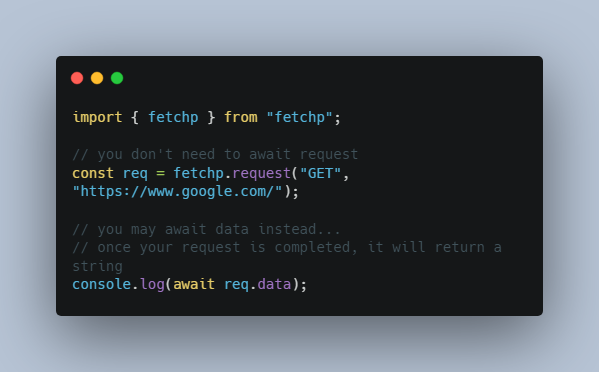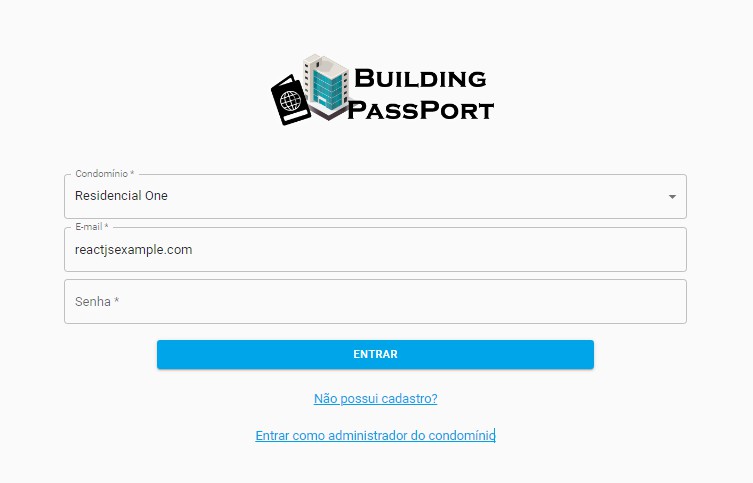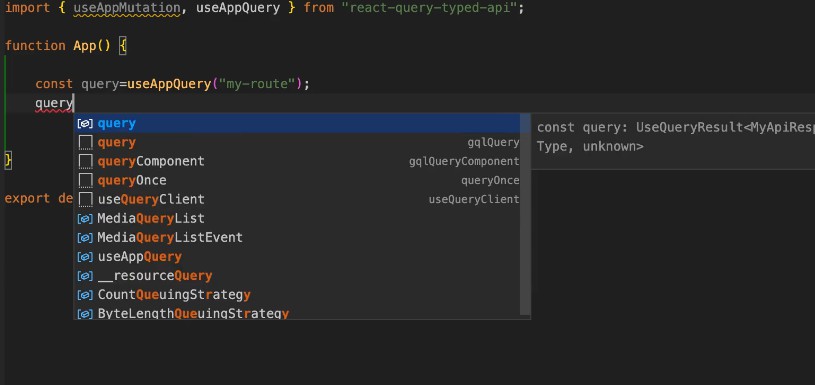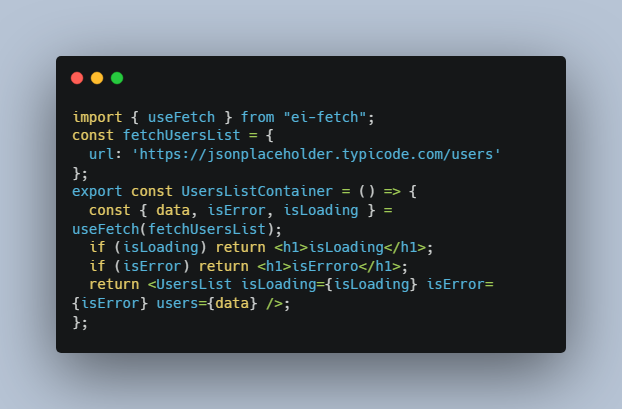? fetchp/fetch+
What is the fetchp/fetch+?
fetchp is “not an another HTTP client but a fetch wrapper with fluent API and superpowers”. The trailing “p” is a means for “plus”.
Why? What’s the motivation?
fetch is a standard Web API has already been supported by modern browsers, Deno, node.js, bun and etc.
We don’t need another HTTP client. Still, a web API’s target audience is very broad. APIs like fetch are being designed carefully by the community and organizations to be used by the general public. Any design mistake can cause lots of unrecoverable problems. For this reason, they’re keeping it simple and running away from the idea of increasing the extra features they can cover.
So, if you want to use fetch, you may need to wrap it with some extra functionality time to time. For example, if you call it from a React web project, checking its loading state almost is a must. Or, if you’re writing automated tests for your application, you need to mock the fetch API.
This is where fetchp comes into play. It still using fetch’s native implementation that brought you by browsers or runtimes themselves, but in the meantime, it wraps the fetch to provide extra functionality for developers.
Fetchp tries to assemble some tools that are useful and reusable for most of the projects that fetch doesn’t provide.
Moreover, since fetchp is a JavaScript module / npm package, it also follows the semantic versioning and its API can be evolved in the future without breaking any project.
Superpowers
- Fluent API
- React Hooks API
- Abortable requests
- Testing-friendly
- Mocking response for requests (not just for tests)
- Setting Base URL
- Automatic deserialization/parsing by content-types
- On-demand fetching
- Fetch status
- Multiple instances of fetchp
- TypeScript Type Support
More to come see Todo List section.
Quick start
Execute npm install fetchp or yarn add fetchp to install fetchp and its
dependencies into your project directory.
Usage
Basic HTTP Request For Text-Based Data
import { fetchp } from "fetchp";
// you don't need to await request
const req = fetchp.request("GET", "https://www.google.com/");
// you may await data instead...
// once your request is completed, it will return a string
console.log(await req.data);
Basic HTTP Request For JSON Data
import { fetchp } from "fetchp";
const req = fetchp.request("GET", "https://jsonplaceholder.typicode.com/posts");
// since your request will return a json, req.data will return an object
console.log(await req.data);
Aborting a Request
import { fetchp, FetchpStatus } from "fetchp";
const req = fetchp.request("GET", "https://jsonplaceholder.typicode.com/posts");
// abort it after 500 milliseconds
setTimeout(() => req.abortController.abort(), 500);
// you can check status afterwars
assert(req.status === FetchpStatus.CANCELED);
Setting a Base URL for Requests
Assume that you’re working with single API on the backend, and you don’t want to repeat yourself by concatenating endpoint URL strings in each request you make.
import { fetchp } from "fetchp";
fetchp.setBaseUrl("https://jsonplaceholder.typicode.com");
const req = fetchp.request("GET", "/posts");
console.log(await req.data);
Middlewares / Hooks
Assume that you’re need to add additional headers to each request you make.
import { fetchp, FetchpHookType } from "fetchp";
fetchp.hooks.add(
FetchpHookType.BuildRequestHeaders,
(headers) => headers.set("Authorization", `Bearer ${getIdToken()}`);
);
const response = fetchp.request(
"GET",
"https://localhost/api/some-restricted-endpoint"",
);
On-Demand Fetching
Assume that you don’t want to invoke the request immediately. You’ll set up an external trigger for this.
import { fetchp } from "fetchp";
const req = fetchp.request("GET", "/posts", { autoFetch: false });
setTimeout(() => req.exec(), 500);
console.log(await req.data);
Mocking an URL for Request
Assume that your API is not yet built on the backend, and you want to mock its behavior.
import { fetchp } from "fetchp";
const mockContent = { hello: "world" };
const mockResponse = (request) => new Response(
JSON.stringify(mockContent),
{
status: 200,
statusText: "OK",
headers: {
"content-type": "application/json",
},
},
);
fetchp.mocks.add(["GET", "POST"], "/hello", mockResponse);
// mocking is done, let's make a request to the mocked URL
const req = fetchp.request("GET", "/hello");
// it will return { hello: "world" }
console.log(await req.data);
Mocking for Testing (Buggy ATM)
Assume that you want to mock your code without dealing with a test framework and
its interfaces / methods. All you need to do is importing fetchp/mock instead
of fetchp module.
// just replace fetchp with fetchp/mock
import { fetchp } from "fetchp/mock";
const req = fetchp.request("GET", "/posts");
console.log(await req.data);
Using with React Hooks
import { useFetchp } from "fetchp";
function MyComponent(props) {
const { data, isLoading, error } = useFetchp("GET", "/posts");
if (isLoading) {
return <div>Loading...</div>;
}
if (error) {
return <div>Error: {error.message}</div>;
}
return <div>{JSON.stringify(data)}</div>;
}
Using with React Hooks, mocking for testing
// just replace fetchp with fetchp/mock
import { useFetchp } from "fetchp/mock";
function MyComponent(props) {
const { data, isLoading, error } = useFetchp("GET", "/posts");
if (isLoading) {
return <div>Loading...</div>;
}
if (error) {
return <div>Error: {error.message}</div>;
}
return <div>{JSON.stringify(data)}</div>;
}
Using with React Hooks, manual fetching
import { useEffect } from "react";
import { useFetchp } from "fetchp";
function MyComponent(props) {
const { data, status, isSuccess, doFetch } = useFetchp(
"GET",
"/posts",
false,
);
useEffect(() => {
// fetch data after 500 milliseconds has passed
setTimeout(() => doFetch(), 500);
}, []);
if (!isSuccess) {
return <div>Status: {status}...</div>;
}
return <div>{status}: {JSON.stringify(data)}</div>;
}
Using with Deno
import { fetchp } from "https://esm.sh/fetchp";
const req = fetchp.request("GET", "https://www.google.com/");
console.log(await req.data);
Todo List
See GitHub Projects for more.
- Fixing the bug in
fetchp/mockmodule - Add advanced support for hooks / middlewares / interceptors
- Protobuf support
- Registering serializers / deserializers by content-type
- Logging adapters
- MAYBE: Reducers / Actions?
- Mechanism for request retries
Requirements
- node.js (https://nodejs.org/)
License
Apache 2.0, for further details, please see LICENSE file
Contributing
See contributors.md
It is publicly open for any contribution. Bugfixes, new features and extra modules are welcome.
- To contribute to code: Fork the repo, push your changes to your fork, and submit a pull request.
- To report a bug: If something does not work, please report it using GitHub Issues.
To Support
Visit my GitHub Sponsors profile at github.com/sponsors/eserozvataf







